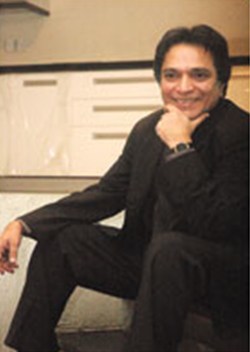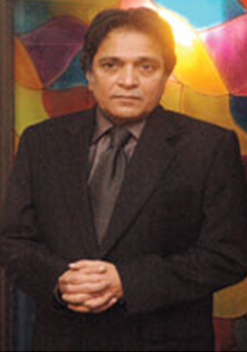Moin Akhtar
This is a collection of articles archived for the excellence of their content. Readers will be able to edit existing articles and post new articles directly |
Moin Akhtar
The comedy icon
By Adil Ahmad
“To catch the attention of viewers in this day and age of channel proliferation requires a high impact production. It’s not just the Pakistani audience anymore that we should be looking at. In this era of the global village, and Pakistan’s need for favourable image within it, we need to put together something that will gain international acclaim,” says Moin Ahktar
Side-splitting audiences with his wisecracks, Moin Akhtar has accumulated a formidable 39 years of stage presence. While comedy has been his primary stock-in-trade, his remarkable stage presence, exemplified by a deep, made for public speaking voice and an ability to think on his feet, has made him a much sought after host of stage shows that have featured the heavyweights of the Indian film industry, in third party locations across the world.
In that sense Moin Akhtar is a seasoned veteran of track-two diplomacy that has sought to keep together the hearts and minds of two antagonistic countries bound by common traditions and cultures. Pakistan has acknowledged his many valuable additions to society with a Pride of Performance in 1992, and a Sitara-e-Imtiaz in 2004.
I met Akhtar the day the skies opened up on Karachi in a big way, and brought on a delectable wintry chill in the midst of the usual traffic chaos. “I enjoy rainfall,” he said, clearly relishing the rain in his new home situated in the idyllic suburbia environs, complete with lush green landscapes and quiet roads. Money, however, is away from his mind as he wrestles to find that one defining project depictive of his maturity as a multi-faceted performer.
“To catch the attention of viewers in this day and age of channel proliferation requires a high impact production. It’s not just the Pakistani audience anymore that we should be looking at. In this day and age of the global village, and Pakistan’s need for favourable image within it, we need to put together something that will gain international acclaim.”
For someone who has made his mark in the Urdu language, his command over English is impressive. He admits to having made a conscious effort at gaining fluency in the lingua franca. “English is the indisputable currency of international exchange, be it ideas, techniques, or the making of money! There is no escaping English if we wish to communicate with the rest of the world,” he says.
The rain, meanwhile, has intensified outside, and Karachi appears to be getting a thorough winter wash. “Rainfall is my weakness,” he says, not realising the pun in his statement, given the weakened condition of the city after each downpour! “It is the essence of life. One gets more humble, and also more romantic!” He says there is an element of inconvenience, putting it mildly, that people complain of after rain. “That inconvenience is of our own making, and our tragedy is that we refuse to learn from our mistakes.”
Akhtar is married with three daughters, two sons, one granddaughter and one grandson. That is the extent to which he is willing to introduce his family. Keeping in mind his high profile vocation, one can understand his quest for privacy in his private life. Not once in his entire career has the photo of any of his family members appeared in the media. Suffice it to say that his private life is flourishing along all the right lines, and he can justifiably claim the high ground in terms of a balanced life well lived.
The Theosophical Society and its hall on M.A.Jinnah Road have featured prominently in his induction into the public space. It was here in the early `60s that he experienced his high point as a prolific school debater. Representing his school at the Theosophical Educational Society’s interschool debate, Akhtar defended the motion ‘Only basic democracy is people’s rule’, and won the first prize, given to him by Ibne Insha.
In the same timeframe Akhtar took part in a school play staged at the Theosophical Hall, Merchant of Venice, and played the role of Shylock so convincingly and with such profundity that he won the best actor award. He still remembers his lines, and as Shylock makes a strong case for the brotherhood of man: ‘….hath not a Jew eyes? Hath not a Jew hands, organs, dimensions, fed with the same food, hurt with the same weapons, subject to the same disease?’
Moin Akhtar became aware of his potential quite by accident, while attending to a sick relative at the Civil Hospital. There he met Naseem Ahmed, a house doctor in the final stages of his MBBS degree. Ahmed was impressed by the schoolboy’s gift for impersonating movie icons like Gregory Peck and David Niven, and also John F. Kennedy.
He was invited to Dow Medical College’s annual day, and without any warning was announced on stage! “After the initial shock I was all right. As a debater, stage fright was not an issue. The audience was spirited and rowdy, and wouldn’t let me speak. So I just stood there for five minutes and let them settle down. After that I pleaded with them to give me a chance, and if they did not like me they could throw me out!”
Moin Akhtar was given his chance, and he proceeded to wow the audience who insisted he stay on stage for an encore. “After I returned to my seat I was approached by a union office bearer of the Nabi Baksh College who offered me an advance payment of Rs10 to make an appearance at their college function. That money changed my life. I realised I could make money doing that which I loved doing.”
Much to Akhtar’s father’s regret he did not graduate. His family was not well off then, and he felt the urgent need to enter practical life to ease the breadwinner’s burden on his father, something that his father did not agree with. Seeing his son’s passion for acting, his father introduced him to his friend S.M.Yusuf, the moviemaker who was working on film ‘Hunahaar’.
Shakeel, then known as Yusuf Kamal, was making his debut in that film, and Moin Akhtar badly wanted to play the role of the hero’s younger brother. S.M.Yusuf, however, sent him packing with instructions to finish his education before venturing into films. “I was very dejected, however, and sometimes regret not having followed his instructions.”
Akhtar was introduced to television by actress Santosh Russel in 1968 who introduced him to Syed Ameer Imam at PTV. “That turned out to be the most embarrassing experience of my life!” he says. “I kept doing imitations of Mohammed Ali, Waheed Murad and Lehri, and Imam Sahab kept reprimanding me, saying that if he wanted those actors he would send for them! He wanted me to be myself, and that I just couldn’t do! Qazi Wajid was a witness to this, and I left PTV quite sure that I would never return here again.”
He got his break with Qasim Jalali’s special transmission for Election `70. “I did a one-man show that clicked and brought me recognition.” Zia Mohyeddin was one of those who saw Akhtar’s performance, and offered him a place on his show. Zia’s command over both Urdu and English had me completely overawed. He tutored me in the art, and for that I am eternally grateful to him.” The programme TV20 followed, celebrating 20 years of PTV, produced by Shoaib Mansoor and Mohsin Ali, and scripted by Anwar Maqsood.
“That is when I gained recognition as a compere. After that there were a series of memorable productions like Channel twelve, Showtime, Intizaar farmayai, Studio dhai, Studio pauney teen, Chaar bees, Such much, Rozi, and Half plate.” Moin Akhtar says his play Rozi, an adaptation of Tootsie done by Saira Kazmi for PTV, completed him as an actor.
Moin Akhtar acknowledges Anwar Maqsood’s scripts written for him as having played a great role in the blossoming of his career. “He and I share a rare chemistry. I understand what he is saying between the lines, and he is comfortable entrusting me with his scripts.”
Akhtar has shared the stage and hosted many shows involving Bollywood greats like Dilip Kumar, Raj Kumar, Amjad Khan, Govinda, Madhuri Dixit, Lata Mangeskar, and Anupan Kher, with his last stage show featuring Rekha, Akshey Kumar, Manisha Koirala, and Sonu Nigam in the USA. In his first ever commercial stage show held in Dubai, Dilip Kumar made his appearance conditional on Moin Akhtar hosting the proceedings. Bollywood stars still woo him to host their stage shows, but he says the element of permissiveness has reached a point where he does not feel comfortable being a part of the proceedings.
His cutting edge involvement with showbiz has made him many well-wishers in high places, including Zia-ul-Haq, Nawaz Sharif, Benazir Bhutto, and Pervez Musharaf, and he is in the process of penning his biography which should make for very interesting reading. He is also doing a weekly column for an Urdu daily.
“I wanted to get into the writing habit for my biography. Now I have developed a real interest in writing, and have churned out quite a few thoughts,” Akhtar says, pointing to a large pile of neatly handwritten papers.
He says he is a good Muslim at heart, and enjoys watching Dr Zakir Naik. He has strong views on democracy, and feels the politicians have let the nation down. “George Bernard Shaw once said if we want to improve our society we should first improve ourselves. We must strive to be legitimate in every sense of the word, be it the payment of taxes and utility bills, not seeking of unfair favours, perks and privileges, not denying the rights of fellow citizens, assisting the deprived and destitute, and caring for one’s parents.”
Moin Akhtar feels that it is not necessary to stand for elected office in order to help society. His idealism, or naivety, shows up in his fondest wish wherein society leaders would set aside their differences, and sit together in a joint think-tank to promote and upgrade Pakistan.

